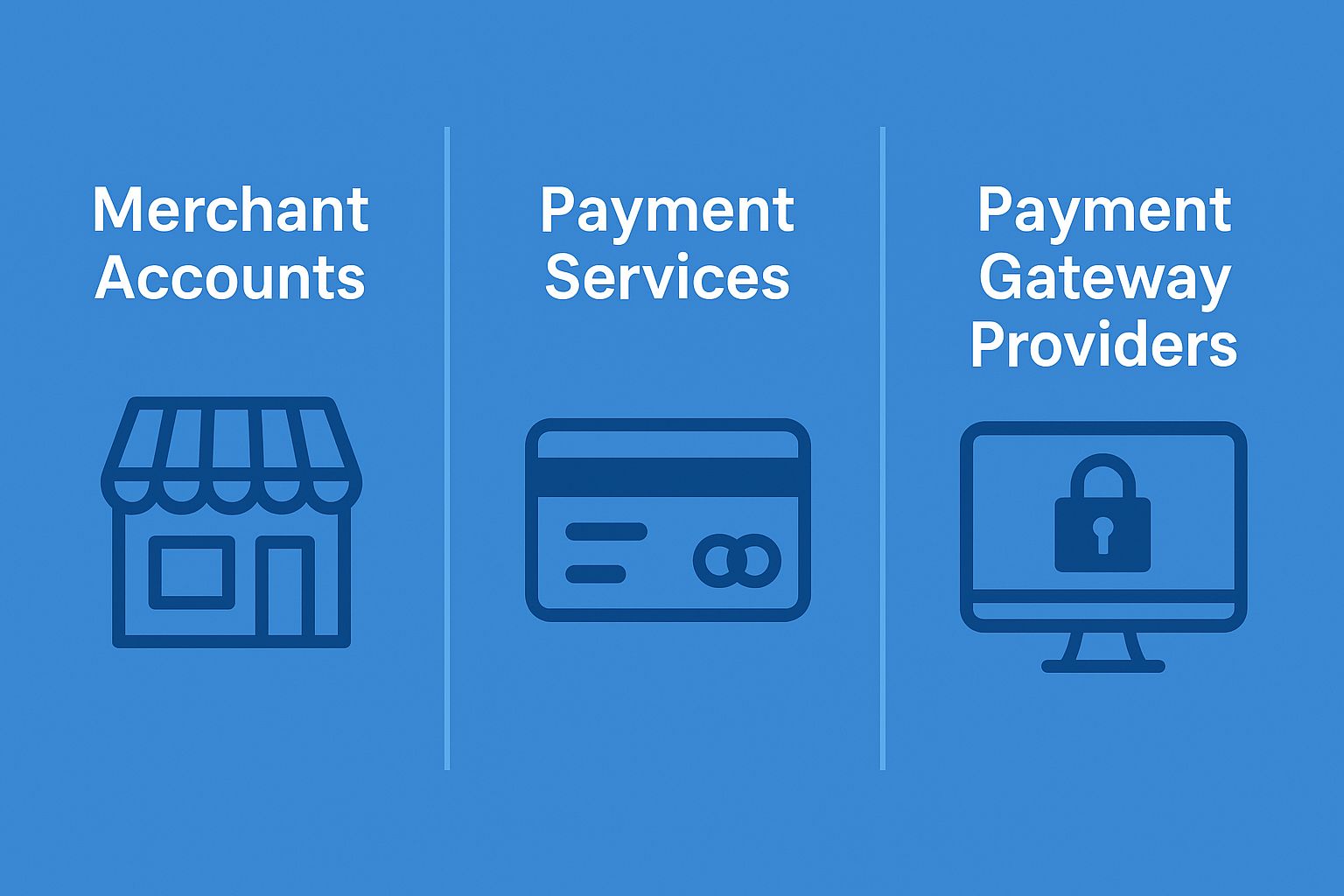In this day and age’s more cashless economy, companies need to be able to process electronic payments effectively. But convenience doesn’t come without an expense, and credit card processing fees can nibble a handsome percentage of your profit. Learning how to reduce and minimize these fees can save your company thousands of dollars a year.

In this complete guide, we’ll dissect the elements of credit card processing, outline the various types of merchant services, and provide you with practical strategies to get the lowest fees possible no matter what size your business is or what industry you’re in.
What Is Credit Card Processing?
Credit card processing is the series of actions that happens when a customer pays with a credit or debit card. It involves several parties, including:
- The merchant account provider
- The payment gateway
- The Credit Card Processing
- The issuing bank (your customer’s bank)
- The acquiring bank (your company’s bank)
- The card networks (Visa, Mastercard, Discover, and American Express)
All of them are involved in authorizing, approving, and settling the transaction and taking a slice. The sum of money taken out of every sale before it reaches your account is all known as credit card processing fees.
Breaking Down Processing Fees
There are three primary payment processing fee categories:
Interchange Fees
These are determined by the card networks and are paid to the issuing bank directly. They differ based on the type of card (e.g., rewards, corporate, debit), method of transaction (online, in-person), and type of business. Average rates 1.15% + $0.05 to 3.25% + $0.10 per transaction. You can’t negotiate interchange fees, but you can shape them by utilizing card-present processing (swiping or inserting cards in person), which is deemed less risky and thus less expensive.
Assessment Fees
These too are non-negotiable and are tiny percentages levied by the card networks themselves. They typically amount to 0.11%–0.13% of every transaction.
Markup Fees
These are billed by your merchant services provider or credit card processor, and they are your best chance to save. These can include:
- Monthly minimum fees
- Gateway fees
- PCI compliance fees
- Chargeback fees
- Termination fees
- Setup or integration charges
- Batch processing or statement fees
Getting the lowest credit card processing rates is knowing these fees, cutting out unnecessary ones, and negotiating better terms.
Selecting the Proper Merchant Services Provider

At the center of your strategy for lowest-cost fees is choosing the proper merchant account and Credit Card Processing. Providers usually provide one of three pricing structures:
Flat-Rate Pricing
One fixed fee per transaction, regardless of card type or payment method. E.g., 2.9% + $0.30.
- Pros: Easy, easy to predict.
- Cons: Costly for high-volume or high-ticket merchants.
Interchange-Plus Pricing
This model forwards the interchange fee to you at cost and tacks on a modest markup (e.g., 0.15% + $0.10). It’s the most transparent and typically the cheapest.
- Pros: Easy to understand breakdown, negotiable markup.
- Cons: Slightly more difficult to read.
Tiered Pricing
Buckets transactions into tiers (qualified, mid-qualified, non-qualified), with the real costs typically hidden.
- Pros: Easier to read than interchange-plus (on paper).
- Cons: Less clear; typically leads to higher processing charges.
For the majority of companies looking for the lowest payment processing fees, interchange-plus pricing is the hands-down winner.
Variables That Determine Your Credit Card Processing Fees
Even with a good provider, there are some variables that determine the final fees you pay:
- Level of industry risk: Travel agencies or online gaming websites, which are high-risk merchants, pay more.
- Method of transaction: Card-present processing is less expensive than online (card-not-present).
- Average size of transactions: Smaller tickets might have higher effective percentages because of per-transaction fees.
- Monthly volume: Greater volume will make you eligible for reduced fees.
- PCI compliance: Not maintaining security standards adds extra PCI compliance fees.
The Best Way to Negotiate Lowest Fees

For the best bargain, you have to shop around and ask questions.
Obtain Itemized Quotes
Order a complete listing of all possible credit card processing fees, such as:
- Monthly account fees
- Per-transaction fees
- Gateway fees
- Monthly minimum fees
- PCI compliance fees
- Chargeback fees
- Early termination fees
Request Interchange-Plus
Steer clear of tiered pricing unless it’s extremely advantageous. Always request interchange-plus and negotiate the markup fee.
Use Your Volume
If your company handles over $10,000 per month, you have negotiating leverage. Make processors bid for your business.
Ask for Fee Waivers
Certain fees, like setup fees, PCI compliance fees, or monthly minimums, can usually be waived if you make a request.
The Best Credit Card Processors for Low Fees
Here are some credit card processing providers that stand out for being affordable and transparent:
Helcim
- No monthly fees
- Transparent interchange-plus pricing
- Volume discounts
- Best for small to medium businesses
Payment Depot
- Membership pricing model
- Wholesale interchange rates
- Best for established or high-volume merchants
Stax by Fattmerchant
- Subscription pricing with 0% markup
- Flat monthly fee
- Strong analytics tools
National Processing
- Low-cost merchant accounts
- Customizable pricing
- Great support for retail, restaurants, and eCommerce
Dharma Merchant Services
- Ethical pricing structure
- Interchange-plus only
- Best for nonprofits, B2B, and small businesses
How to Maximize Your Payment Flow for Reduced Fees
Utilize a Secure Payment Gateway
Select a payment gateway that integrates well with your merchant account and has minimal or no monthly fees. Be cautious of gateway setup fees or surprise charges.
Recommended gateways:
- Authorize.net
- Stripe
- NMI
- Braintree
Minimize Chargebacks
Every chargeback is $15–$50 and can risk your account. Avoid them by:
- Utilizing AVS and CVV verification
- Providing clear refund policies
- Handling disputes promptly
Be PCI Compliant
Falling out of compliance with PCI DSS security standards may result in monthly PCI compliance fees or even significant fines.
Ask your provider:
- Do you assist us in staying PCI compliant?
- Are there non-compliance fees?
Promote Card-Present Transactions
In-person card transactions are safer and cheaper. Invest in a reputable POS system to make swiping or dipping simple and safe.
Employ a Cash Discount Program
Some merchants have compliant methods for lawfully shifting the credit card processing fees on to customers opting to pay via cards, discounting those who pay cash.
What About Internet Businesses?
If you have an eCommerce business, your rates could be a touch higher since card-not-present transactions pose greater risks. Here’s how to minimize them:
- Apply 3D Secure authentication
- Tokenize cardholder information
- Deploy fraud protection software
- Select an online-performance-optimized gateway
Also, check for high-risk merchant accounts if your business belongs to types such as travel, subscription billing, or adult content. These accounts are experts in handling businesses that ordinary providers might refuse to serve.
Shying Away from Sneaky Fees in Your Merchant Services Agreement
As you go through your merchant services agreement, watch out for:
- Termination fees: These are as high as $500.
- Monthly statement fees: Typically $5–$10.
- Batch fees: Paid every time you settle daily transactions.
- Non-qualified surcharges: Hidden in tiered pricing. Always ask for an explicit fee schedule in writing.
The Role of Technology in Lowering Fees
The future of credit card acceptance is being rewritten by technology:
- AI-based fraud detection reduces risk and interchange fees.
- Mobile payments such as Apple Pay and Google Pay frequently receive reduced rates.
- Cryptocurrency transactions circumvent the usual networks (but with volatility and regulatory uncertainty).
- Buy Now, Pay Later (BNPL) services offer flexibility but could charge higher fees consider accordingly.
Conclusion
Whether you’re starting out or processing millions per year, the key to securing the lowest credit card processing fees is being proactive. That means:
- Comparing multiple credit card processing providers
- Understanding how payment processing fees work
- Choosing transparent pricing models
- Reducing fraud and chargebacks
- Maintaining PCI compliance
- Avoiding hidden costs in your merchant services agreement
Remember, even a reduction in your effective processing rate by 0.5% can save your business thousands of dollars every year. Educate yourself, negotiate intelligently, and don’t be afraid to change providers if you get a better deal.
FAQs
How much is the typical Credit Card Processing Lowest Fees for small businesses?
The typical Credit Card Processing Lowest Fees for small businesses generally falls between 1.5% and 3.5% per transaction, varying based on the card type, method of transaction, and merchant services provider. Card-present transactions typically have lower rates than online payments.
Can I negotiate Credit Card Processing Lowest Fees?
Yes, most elements of Credit Card Processing Lowest Fees particularly the markup fee your credit card processor charges are negotiable. Leverage your volume of transactions and request interchange-plus pricing over flat or tiered rates.
How are interchange, assessment, and markup fees different?
Interchange fees are established by the card networks and are paid to the issuing bank. Assessment fees are levied by the card networks themselves. Markup charges are levied by your payment gateway or merchant services company and can be negotiated.
What’s the best price model to acquire the lowest charges?
Interchange-plus pricing tends to be the most transparent and least expensive pricing model for the majority of companies. It divorces the interchange fees, which are non-negotiable, from the markup of the processor, allowing easier cost control.
Do there exist surprise charges I must be aware of?
Yes. Typical surprise fees are:
- Monthly minimum fees
- Gateway fees
- PCI compliance fees
- Termination fees
- Chargeback fees
- Batch processing fees
Always ask for a complete fee schedule prior to signing a merchant services agreement.
Does online business pay higher processing fees?
Typically, yes. Online transactions are card-not-present, and these are riskier and therefore incur higher interchange fees. But you can minimize them through the use of a secure payment gateway, fraud detection, and PCI compliance.
What are chargeback fees and how can I avoid them?
Chargeback fees are fines when a customer contests a transaction. They normally vary between $15 and $50. To prevent them, employ fraud prevention tools, post clearly return policies, and handle disputes in a timely manner.
How will PCI compliance impact my fees?
If your business is not PCI compliant, your provider can also charge extra PCI compliance fees or non-compliance penalties. Having PCI DSS compliance saves you from these fees and keeps your risk of data breaches low.
Are there providers offering zero processing fees?
Some merchants provide cash discount programs or surcharging, in which lowest fees for credit card processing are transferred to customers who pay with a card. These programs can save or eliminate your credit card processing fees, but you must comply with local laws.
Can I change credit card processors at any time?
Yes, but check your current contract for termination fees or auto-renewal clauses. It’s important to compare offers from different lowest fees for credit card processing providers to ensure you’re getting the best deal.
